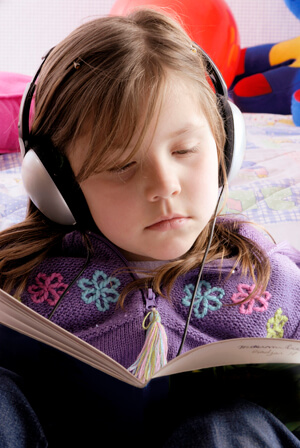The Connection Between Music, Reading, and Language Development
 According to recent research, music can improve speech and reading skills by increasing one’s ability to distinguish between different sounds and understand the patterns of language. Nina Kraus, director of the Auditory Neuroscience Laboratory at Northwestern University explained: “People's hearing systems are fine-tuned by the experiences they've had with sound throughout their lives. Music training is not only beneficial for processing music stimuli. We've found that years of music training may also improve how sounds are processed for language and emotion. For example, the trained brain gets better at detecting patterns in sounds, so that musicians are better at picking out the voice of a friend in a noisy restaurant.”
According to recent research, music can improve speech and reading skills by increasing one’s ability to distinguish between different sounds and understand the patterns of language. Nina Kraus, director of the Auditory Neuroscience Laboratory at Northwestern University explained: “People's hearing systems are fine-tuned by the experiences they've had with sound throughout their lives. Music training is not only beneficial for processing music stimuli. We've found that years of music training may also improve how sounds are processed for language and emotion. For example, the trained brain gets better at detecting patterns in sounds, so that musicians are better at picking out the voice of a friend in a noisy restaurant.”
Kraus also added: “Playing an instrument may help youngsters better process speech in noisy classrooms and more accurately interpret the nuances of language that are conveyed by subtle changes in the human voice… When people first learn to talk and when they talk to babies they often use musical patterns in their speech.”
This understanding of sound patterns would be very beneficial to students learning how to read, especially ESL (English as a Student Language) students. In connection with explicit phonics instruction, music can help ESL students increase their awareness of the sounds in the English language (phonemic awareness). Students would still need to learn how to connect sounds to their letter representations, but music exposure would help language and reading make more sense as they learn more and improve their skills.
Another link between music and the ability to read is the overlap of the brain connections which process music and language. Aniruddh D. Patel of The Neurosciences Institute in San Diego said: "Nouns and verbs are very different from tones and cords and harmony, but the parts of the brain that process them overlap." From analyzing recent research Patel also believes that music doesn’t appeal to a few areas of the brain, but
Research also showed that the brain connections which result from music exposure help strengthen the brain's ability to complete tasks unrelated to music. Gottfried Schlaug, associate professor of neurology at Harvard Medical School, explained how this works by stating: “Music making is a multisensory experience, activating links to several parts of the brain.”
These two articles further relate music to education:
“How Music Feeds and Steers Your Imagination”: about how music can enhance creativity.
“Music On Your Child’s Mind: Improving Focus Through Song”: about how music can increase focus.
2 Comments

Porsche 911 Turbo Brakes said
I think that the connection between music, reading, and music development is critical for the brain process of creativity and a sense of individualism. As we are being taught by our parents with what to do and what not to do, music has the same effect and creates a likeness for what music development there is. Great article and I hope you have a happy holiday!!!!

Gretta said
Reading is so important! Kids need it not only to further the development in the brain but also it helps with speech and sounds. It does so much good and takes such little time. Parents should take that opportunity to start a special bond between them and their kids.